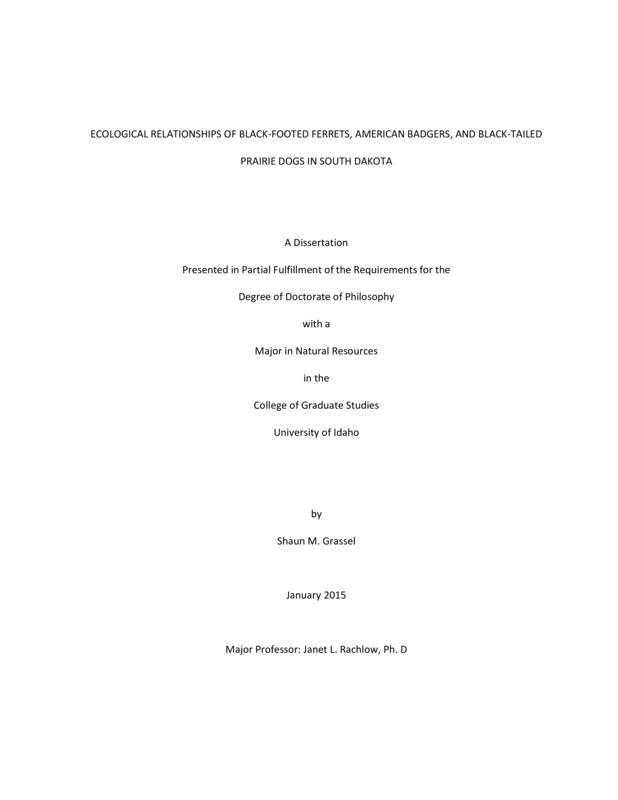Ecological relationships of black-footed ferrets, American badgers, and black-tailed prairie dogs in South Dakota
Grassel, Shaun M.. (2015). Ecological relationships of black-footed ferrets, American badgers, and black-tailed prairie dogs in South Dakota. Theses and Dissertations Collection, University of Idaho Library Digital Collections. https://www.lib.uidaho.edu/digital/etd/items/grassel_idaho_0089e_10502.html
- Title:
- Ecological relationships of black-footed ferrets, American badgers, and black-tailed prairie dogs in South Dakota
- Author:
- Grassel, Shaun M.
- Date:
- 2015
- Keywords:
- Cynomys ludovicianus interspecific interactions Mustela nigripes specialization Taxidea taxus winter severity
- Program:
- Natural Resources
- Subject Category:
- Ecology; Wildlife conservation
- Abstract:
-
Black-footed ferrets (Mustela nigripes) and American badgers (Taxidea taxus) co-exist in prairie dog (Cynomys spp.) ecosystems in North America. Ferrets are a federally-endangered mustelid that preys almost exclusively on prairie dogs and uses prairie dog burrows as shelter. Although badgers are morphologically specialized to excavate and prey on burrowing rodents, they often consume a diversity of vertebrates (primarily mammals), invertebrates, and plant material, and they sometimes kill ferrets. Black-tailed prairie dogs (C. ludovicianus) are stout, colonial ground squirrels that are often recognized as ecosystem engineers and as a keystone species in the grassland ecosystems of North America. We examined some of the ecological relationships among these three species at 2 study sites in South Dakota from 2008 to 2010. We documented asymmetric patterns of avoidance of badgers by ferrets based on the sex of both species. Female ferrets avoided adult female badgers, but not male badgers, and male ferrets exhibited less avoidance than female ferrets. Additionally, avoidance decreased with increasing densities of prairie dogs. Our results suggest that intersexual differences in space use by badgers creates varying distributions of predation risk that are perceived by the smaller carnivore (ferrets), and that females respond more sensitively than males to that risk. The positive association between security and food resources likely reduces the need for ferrets to trade off productive but risky habitats for less productive, safer ones. In our study, reproduction by prairie dogs was strongly influenced by precipitation received during the previous year and winter severity. Harsh winter conditions resulted in a marked decline in reproduction during one of the years of our study. In contrast, reproduction by ferrets varied little across years of our study, despite a marked decrease in the reproduction of prairie dogs during one year. Lastly, despite badgers often being characterized as generalists, we provide evidence of local specialization; badgers in our study behaved as prairie dog specialists. Badgers selected for prairie dog colonies and for areas of prairie dog colonies that had high densities of prairie dog burrows. On multiple scales, badgers in our study exhibited a narrow use of resources in comparison to the resources available. The common thread of our study was the influence of prairie dogs on the ecology of 2 native carnivores. Without adequate conservation, the functional role of prairie dogs in the grassland ecosystem as a keystone species will be diminished; thus the conservation of prairie dog colonies will not only benefit prairie dogs, but also badgers, ferrets, and other species associated with the prairie dog - grassland ecosystem.
- Description:
- doctoral, Ph.D., Natural Resources -- University of Idaho - College of Graduate Studies, 2015
- Major Professor:
- Rachlow, Janet L
- Committee:
- Bunting, Stephen C; Garton, Edward O; Scott, J M
- Defense Date:
- 2015
- Identifier:
- Grassel_idaho_0089E_10502
- Type:
- Text
- Format Original:
- Format:
- application/pdf
- Rights:
- In Copyright - Educational Use Permitted. For more information, please contact University of Idaho Library Special Collections and Archives Department at libspec@uidaho.edu.
- Standardized Rights:
- http://rightsstatements.org/vocab/InC-EDU/1.0/

